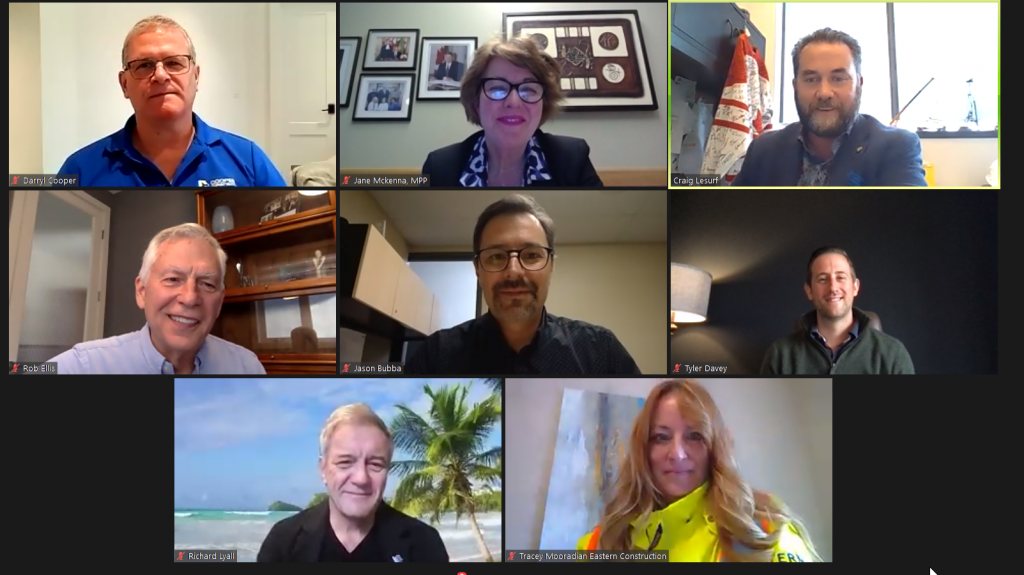Ontario contractors and other construction stakeholders marked the province’s inaugural Occupational Safety and Health Day by gathering online to praise the originator of the concept, define what the day means and pledge to work towards an Ontario with zero workplace injuries.
Speakers during an online forum hosted by the Ontario General Contractors Association May 4 paid tribute to Jane McKenna, parliamentary assistant to the Minister of Labour, Training and Skills Development and MPP for Burlington, who worked to get Bill 152, the Occupational Safety and Health Day Act, passed just a week ago.
“Today I’m celebrating with friends and I’m celebrating with great Canadians across our province,” said Rob Ellis, president of MySafeWork.
“I want to congratulate the amazing visionary leadership of Member of Provincial Parliament Jane McKenna. You are simply amazing and we are all really proud for your visionary approach to creating Occupational Safety and Health Day. This is going to really make a big difference. This is going to be a cornerstone for many years to come.”
Ellis told the story of how his young son, Dave, died in a workplace mishap 21 years ago and McKenna followed by recounting how another young worker, Lewis Wheelan of Sault Ste. Marie, suffered catastrophic injuries in May 2001 when a disabled hydro line fell on him causing him to lose three limbs. It was his second day on a summer job clearing vegetation around power lines.
“We owe it to Lewis, to Rob’s son Dave, and to every young worker injured or killed at work to do more to protect young people entering the workplace. As a mother of five, the stories of Dave Ellis, Lewis Wheelan and so many other young, young workers killed on the job was my own motivation for Bill 152,” said McKenna.
She singled out support for the cause from the Canadian Registered Safety Professionals, the OGCA and the Labourers’ International Union of North America.
OGCA health and safety committee chair Craig Lesurf of Gillam Group hosted the event.
“Today is about celebration and education. It’s about talking about the future,” he said. “Our ultimate goal is zero injuries and zero accidents in our workplace, and most certainly zero fatalities, and we have to do something about it.
“The only way to do that is to create days and awareness and talk about safety.”
One speaker, Tracey Mooradian, a health and safety manager with Eastern Construction, took note of the especially difficult year the whole sector has endured since the start of the pandemic, with COVID-19 creating much uncertainty, colleagues becoming sick and dying and then a spate of other deaths in December and January.
“We suffered loss after loss of our comrades in the industry,” she said. “It was like we had turned on the tap and we just couldn’t turn it off fast enough, there were too many memorials built on our jobsites in Ontario.
“So thank you to MPP McKenna and the industry leaders for their support to push this Occupational Safety and Health Day forward. It’s a big piece I believe to keeping our industry attentive, diligent, proactive versus reactive, active versus passive, with safety in these workplaces.”
Darryl Cooper, president and COO of Cooper Equipment Rentals, urged construction executives to take full control of health and safety in their firms and not leave it to health and safety committees.
“I’m constantly asking my team, ‘Are we safer today than we were yesterday? How can we be safer tomorrow than we are today?’”
Drilling down on safety should be extended to situational awareness not only at workplaces but beyond, Cooper said.
“According to the Centers for Disease Control, 75 per cent of all accidents are the result of unintentional household injury,” he stated. “I’d like to see a world where employees take the safety skills that they use at work and apply them to their everyday lives.”
Jason Bubba, chief operating officer of NORCAT, spoke about further extending the notion of safety culture to include young people who are not yet in the sector. Students should grow up learning how to perform work safely, he said.
“If they don’t learn those bad habits and they grow up understanding their rights and responsibilities, then we’re fostering that culture of health and safety where we really should,” said Bubba.
Richard Lyall, president of the Residential Construction Council of Ontario, suggested the fight against racism in the sector is also a health and safety issue.
“Anyone who’s working on a construction site knows that you want to know that everybody else on that site’s got your back, and if they hesitate for a second because they don’t like the way you look or the colour of your skin or how you sound, that’s bad news, and it’s very dangerous.
“So that’s a message that we’ve been trying to bring.”
Follow the author @DonWall_DCN.











Recent Comments
comments for this post are closed